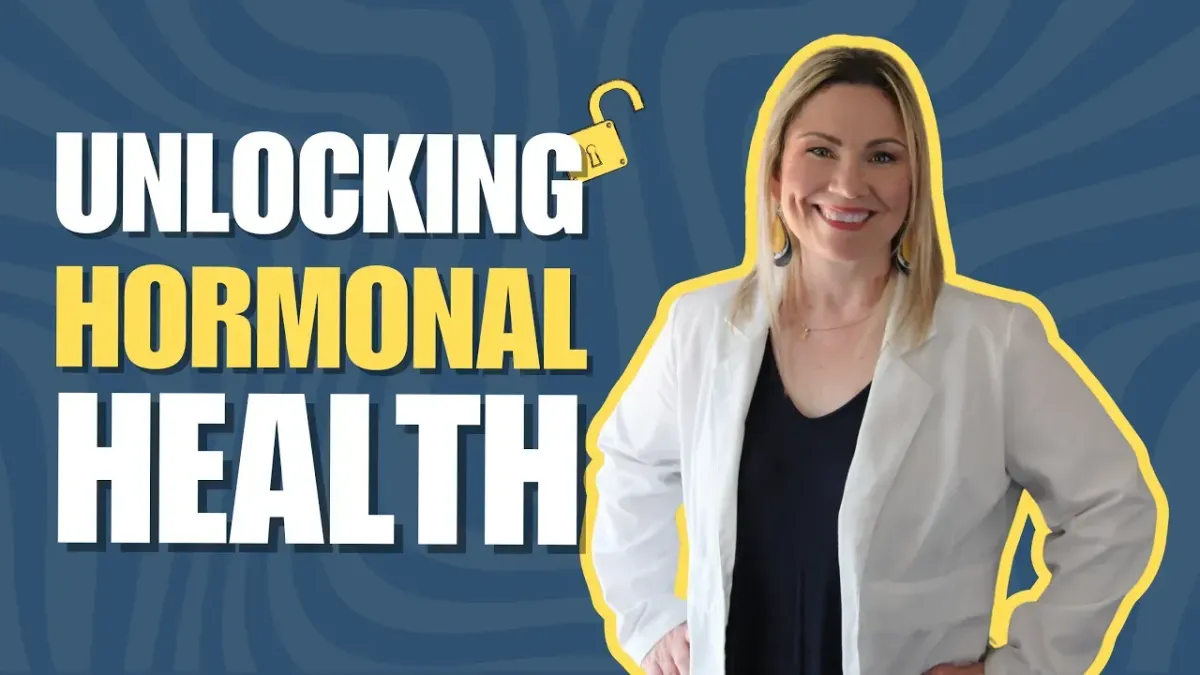
The Hidden Signs of Hormone Imbalance You Can't Ignore
Do you ever feel totally off—like you're running on empty, snapping at everyone around you, or wondering where your energy disappeared to? Here's something that might surprise you: it might not be you at all. Your hormones could be trying to get your attention.
I'm Jennifer Gaudet, nurse practitioner and owner of Everyday Wellness here in Wichita, Kansas. Today, we're diving into something that impacts every part of your life: your sex hormones. Those little messengers control everything from your energy to your mood, and even how you feel about yourself.
Understanding Your Sex Hormones: The Body's Traffic Control System
Before we dive into the signs and symptoms, let's get clear on what we're actually talking about. Understanding how these hormones work will help you recognize when something's off.
What Are Sex Hormones?
Think of your sex hormones as the little guys running the show behind the scenes. Each one has its own special job, and when they're working together harmoniously, you feel like your best self.
Estrogen keeps your bones strong, your skin glowing, and your mood mostly steady (though you may still have a couple of days where you're feeling a little... well, you know). This hormone is often thought of as the "female" hormone, but men need it too for bone health and brain function.
Progesterone is like your chill hormone. It helps you sleep better and balances everything out. Think of it as nature's calming influence—when progesterone is doing its job, you feel more relaxed and sleep comes easier.
Testosterone is your go-getter hormone, fueling your energy, focus, and yes—your sex drive. Both men and women need testosterone, though men typically have much higher levels. When testosterone is optimized, you feel motivated, strong, and confident.
The Traffic Light Analogy
Here's why this balance matters so much: I like to think of hormones like traffic lights. They keep everything flowing smoothly throughout your body. But when they're out of sync, it's like a traffic jam in your body—and no one likes that. When one hormone gets out of balance, it affects all the others, creating a cascade of symptoms that can leave you feeling like a stranger in your own body.
Why Your Hormones Matter More Than You Think
Now that you understand what these hormones do, let's talk about why paying attention to them is so important. These hormones are doing so much more than you might realize, and when they're out of balance, the effects ripple through every aspect of your life.
Energy and Motivation
If you've been wondering why you feel exhausted even after a full night's sleep, your hormones might hold the answer.
Low energy? Could be your testosterone and progesterone are slacking off a little bit. When these hormones drop, it's like trying to run a car on an empty gas tank—you might move forward, but you're definitely not operating at full capacity.
Feeling unmotivated? Your hormones might need some attention, especially if you used to be the type of person who tackled challenges head-on.
Mood and Emotional Health
Perhaps nothing is more frustrating than feeling emotionally unpredictable.
Feeling grumpy or teary over the smallest things? Hello, estrogen roller coaster. When estrogen fluctuates wildly, it can feel like you're on an emotional roller coaster that never stops.
Mood swings taking over your life? This could be hormonal, and you're not losing your mind—you're experiencing a very real physical response to chemical changes in your body.
Physical Changes You Might Not Expect
Some of the most surprising hormone imbalance symptoms show up in ways you'd never connect to your hormones.
Not in the mood at all? That's a common red flag for low testosterone in both men and women.
Skin suddenly dry or hair thinning? Your hormones could be waving a red flag, trying to get your attention through these visible changes.
The bottom line is this: if you feel just "off," your sex hormones might be the missing piece of the puzzle. Too often, we dismiss these feelings as stress, aging, or just being busy, but your body is actually trying to communicate something important to you.
What Happens When Hormones Go Rogue
When hormones become imbalanced, the symptoms can feel overwhelming and confusing. Let me break down what this looks like for different people, so you can better understand what your body might be experiencing.
For Women
Women often experience hormone imbalance in waves, especially during perimenopause and menopause, but it can happen at any age. You might notice irregular periods that throw off your entire monthly rhythm, hot flashes that seem to come out of nowhere, or an overwhelming sense of being "not yourself"—like you're watching someone else live your life while you feel disconnected from who you used to be.
For Men
Men, don't think you're off the hook here. Male hormone imbalance, often called andropause, is real and increasingly common. Low testosterone can leave you feeling tired no matter how much you sleep, mentally fuzzy when you used to be sharp and focused, and just not yourself—like you've lost that spark that made you feel confident and capable.
The key thing to understand is that these changes don't happen overnight, which is why they're so easy to dismiss or attribute to other factors.
The Root Causes: Why Hormones Get Out of Balance
Understanding why hormones become imbalanced in the first place can help you make sense of what you're experiencing. It's rarely just one factor—usually, it's a combination of modern life stressors that gradually push your hormones out of their optimal range.
Several factors can throw your hormones off track, and chances are, you'll recognize more than one of these in your own life:
Stress - Life is crazy, right? Chronic stress elevates cortisol, which then interferes with the production and function of your sex hormones. When your body thinks it's constantly under threat, it prioritizes stress hormones over reproductive hormones.
Sleep - Or lack thereof. Poor sleep quality or insufficient sleep directly impacts hormone production. Your body does most of its hormone manufacturing and regulation while you sleep, so when that's disrupted, everything else follows.
Diet - What you eat matters more than you might think. Processed foods, excess sugar, and inadequate protein can all contribute to hormonal chaos, while nutrient deficiencies make it harder for your body to produce hormones effectively.
Aging - This one is natural and inevitable, but here's where I want to challenge a common assumption...
Here's the big BUT that changes everything: Just because you're getting older doesn't mean you have to accept feeling worse. That's the good news and the foundation of everything we do at our practice. Aging is inevitable, but suffering through it with depleted hormones is absolutely optional.
Your Roadmap Back to Hormonal Balance
The good news is that you don't have to stay stuck feeling this way. There's a clear path forward, and it starts with simple steps you can take today, then progresses to more targeted interventions when needed.
Step 1: Start Simple
Before jumping into any treatments, let's begin with foundational changes that support your body's natural hormone production. These might seem basic, but they're incredibly powerful when implemented consistently.
Pay attention to how you feel—your energy, mood, and sleep patterns. Start jotting it down and tracking patterns. You might be surprised by what you discover when you actually document how you feel throughout the month. Fuel your body with good stuff: healthy fats, proteins, and vegetables that provide the building blocks your body needs to make hormones. And please, make sleep a priority. Your hormones literally reset while you sleep, so this isn't negotiable if you want to feel better.
Step 2: Consider Professional Help
Sometimes lifestyle changes alone aren't enough, and that's completely normal and okay. Sometimes you need a little extra help, and that's where personalized care comes in. A simple test can pinpoint exactly what's going on, and treatments like bioidentical hormone therapy can make a huge difference.
The key is working with someone who understands that you're not just a number on a lab report—you're a whole person with unique needs, goals, and concerns.
The Goal: Feeling Like Yourself Again
This entire journey has one ultimate destination: getting you back to feeling like yourself. Trust me, it's not about masking symptoms—it's about getting you back to feeling like yourself. Remember how it felt to be in your twenties? That energy, that zest for life, that feeling of being comfortable in your own skin? We can get close to that again, and in many cases, you might even feel better than you did decades ago because now you have the wisdom and tools to truly optimize your health.
You Don't Have to Keep Running on Empty
Here's what I want you to remember as we wrap up: you don't have to keep feeling like you're running on empty. If any of this resonated with you, don't ignore it. It's your body's way of saying, "Hey, something's up," and your body deserves to be heard.
Your hormones are powerful messengers, and when they're balanced, you'll feel the difference in your energy, mood, and overall sense of well-being. The key is listening to what your body is telling you and taking action. Too many people—especially women—are told that feeling exhausted, moody, or "off" is just part of getting older. I'm here to tell you that's simply not true.
You have the right to feel vibrant, energetic, and like yourself at any age. Hormonal balance isn't a luxury—it's a fundamental part of your health and well-being that affects every aspect of your life, from your relationships to your work performance to your overall happiness.
Ready to Take the Next Step?
If you're tired of feeling off and ready to reclaim your energy and vitality, it's time to dig deeper into what's really going on with your hormones. At Everyday Wellness, we specialize in helping people just like you get back to feeling like their best selves through personalized hormone optimization.
We don't believe in one-size-fits-all approaches or telling you that your symptoms are "normal for your age." Instead, we take the time to understand your unique situation, run comprehensive testing, and create a personalized plan that addresses your specific needs and goals.
Don't let hormone imbalance control your life any longer. You deserve to feel energetic, confident, and like yourself again—and we're here to help you get there.
About the Author: Jennifer Gaudet is a nurse practitioner and owner of Everyday Wellness in Wichita, Kansas, specializing in functional medicine and bioidentical hormone therapy. Her mission is to help people take control of their health and feel their best at every stage of life.


